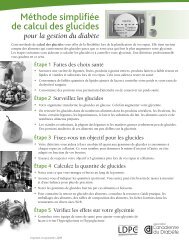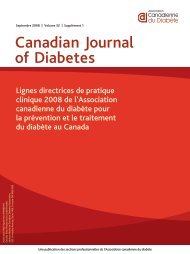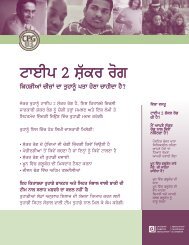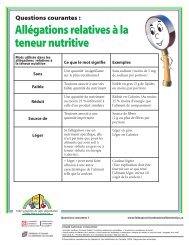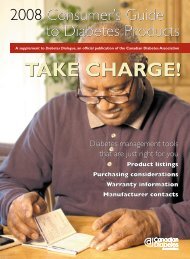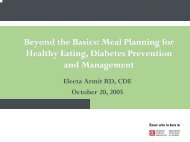2008 Clinical Practice Guidelines - Canadian Diabetes Association
2008 Clinical Practice Guidelines - Canadian Diabetes Association
2008 Clinical Practice Guidelines - Canadian Diabetes Association
You also want an ePaper? Increase the reach of your titles
YUMPU automatically turns print PDFs into web optimized ePapers that Google loves.
<strong>2008</strong> CLINICAL PRACTICE GUIDELINES<br />
S50<br />
prandial insulin lispro – a comparative crossover trial in<br />
patients with type 1 diabetes. Diabet Med. 2004;21:279-284.<br />
13. Jovanovic L, Giammattei J, Acquistapace M, et al. Efficacy<br />
comparison between preprandial and postprandial insulin<br />
aspart administration with dose adjustment for unpredictable<br />
meal size. Clin Ther. 2004;26:1492-1497.<br />
14. Bott U, Ebrahim S, Hirschberger S, et al. Effect of the rapidacting<br />
insulin analogue insulin aspart on quality of life and<br />
treatment satisfaction in patients with type 1 diabetes. Diabet<br />
Med. 2003;20:626-634.<br />
15. Dreyer M, Prager R, Robinson A, et al. Efficacy and safety of<br />
insulin glulisine in patients with type 1 diabetes. Horm Metab<br />
Res. 2005;37:702-707.<br />
16. Garg SK, Rosenstock J,Ways K. Optimized basal-bolus insulin<br />
regimens in type 1 diabetes: insulin glulisine versus regular<br />
human insulin in combination with basal insulin glargine.<br />
Endocr Pract. 2005;11:11-17.<br />
17. Warren E, Weatherley-Jones E, Chilcott J, et al. Systematic<br />
review and economic evaluation of a long-acting insulin analogue,<br />
insulin glargine. Health Technol Assess. 2004;8:1-57.<br />
18. Wang F, Carabino JM,Vergara CM. Insulin glargine: a systematic<br />
review of a long-acting insulin analogue. Clin Ther. 2003;<br />
25:1541-1577.<br />
19. Dunn CJ, Plosker GL, Keating GM, et al. Insulin glargine: an<br />
updated review of its use in the management of diabetes mellitus.<br />
Drugs. 2003;63:1743-1778.<br />
20. Chapman TM, Perry CM. Insulin detemir: a review of its use<br />
in the management of type 1 and 2 diabetes mellitus. Drugs.<br />
2004;64:2577-2595.<br />
21. Rossetti P, Pampanelli S, Fanelli C, et al. Intensive replacement<br />
of basal insulin in patients with type 1 diabetes given rapid-acting<br />
insulin analog at mealtime: a 3-month comparison between<br />
administration of NPH insulin four times daily and glargine<br />
insulin at dinner or bedtime. <strong>Diabetes</strong> Care. 2003;26:1490-1496.<br />
22. Plank J, Bodenlenz M, Sinner F, et al. A double-blind, randomized,<br />
dose-response study investigating the pharmacodynamic<br />
and pharmacokinetic properties of the long-acting<br />
insulin analog detemir. <strong>Diabetes</strong> Care. 2005;28:1107-1112.<br />
23. De Leeuw I, Vague P, Selam JL, et al. Insulin detemir used in<br />
basal-bolus therapy in people with type 1 diabetes is associated<br />
with a lower risk of nocturnal hypoglycaemia and less<br />
weight gain over 12 months in comparison to NPH insulin.<br />
<strong>Diabetes</strong> Obes Metab. 2005;7:73-82.<br />
24. Porcellati F, Rossetti P, Busciantella NR, et al. Comparison of<br />
pharmacokinetics and dynamics of the long-acting insulin<br />
analogs glargine and detemir at steady state in type 1 diabetes:<br />
a double-blind, randomized, crossover study. <strong>Diabetes</strong> Care.<br />
2007;30:2447-2452.<br />
25. Home P, Bartley P, Russell-Jones D, et al; Study to Evaluate the<br />
Administration of Detemir Insulin Efficacy, Safety and<br />
Suitability (STEADINESS) Study Group. Insulin detemir offers<br />
improved glycemic control compared with NPH insulin in<br />
people with type 1 diabetes: a randomized clinical trial.<br />
<strong>Diabetes</strong> Care. 2004;27:1081-1087.<br />
26. Hermansen K, Fontaine P, Kukolja KK, et al. Insulin analogues<br />
(insulin detemir and insulin aspart) versus traditional human<br />
insulins (NPH insulin and regular human insulin) in basalbolus<br />
therapy for patients with type 1 diabetes. Diabetologia.<br />
2004;47:622-629.<br />
27. Kudva YC, Basu A, Jenkins GD, et al. Randomized controlled<br />
clinical trial of glargine versus ultralente insulin in the treatment<br />
of type 1 diabetes. <strong>Diabetes</strong> Care. 2005;28:10-14.<br />
28. Ashwell SG, Amiel SA, Bilous RW, et al. Improved glycaemic<br />
control with insulin glargine plus insulin lispro: a multicentre,<br />
randomized, cross-over trial in people with type 1 diabetes.<br />
Diabet Med. 2006;23:285-292.<br />
29. Zinman B, Tildesley H, Chiasson JL, et al. Insulin lispro in<br />
CSII: results of a double-blind crossover study. <strong>Diabetes</strong>. 1997;<br />
46:440-443.<br />
30. Bode B, Weinstein R, Bell D, et al. Comparison of insulin<br />
aspart with buffered regular insulin and insulin lispro in continuous<br />
subcutaneous insulin infusion: a randomized study in<br />
type 1 diabetes. <strong>Diabetes</strong> Care. 2002;25:439-444.<br />
31. Radermecker RP, Scheen AJ. Continuous subcutaneous insulin<br />
infusion with short-acting insulin analogues or human regular<br />
insulin: efficacy, safety, quality of life, and cost-effectiveness.<br />
<strong>Diabetes</strong> Metab Res Rev. 2004;20:178-188.<br />
32. Siebenhofer A, Plank J, Berghold A, et al. Meta-analysis of<br />
short-acting insulin analogues in adult patients with type 1 diabetes:<br />
continuous subcutaneous insulin infusion versus injection<br />
therapy. Diabetologia. 2004;47:1895-1905.<br />
33. Quattrin T, Bélanger A, Bohannon NJ, et al; Exubera Phase III<br />
Study Group. Efficacy and safety of inhaled insulin (Exubera)<br />
compared with subcutaneous insulin therapy in patients with<br />
type 1 diabetes: results of a 6-month, randomized, comparative<br />
trial. <strong>Diabetes</strong> Care. 2004;27:2622-2627.<br />
34. Skyler JS,Weinstock RS, Raskin P, et al; Inhaled Insulin Phase<br />
III Type 1 <strong>Diabetes</strong> Study Group. Use of inhaled insulin in a<br />
basal/bolus insulin regimen in type 1 diabetic subjects: a 6month,<br />
randomized, comparative trial. <strong>Diabetes</strong> Care. 2005;<br />
28:1630-1635.<br />
35. Gerber RA, Cappelleri JC, Kourides IA, et al.Treatment satisfaction<br />
with inhaled insulin in patients with type 1 diabetes: a<br />
randomized controlled trial. <strong>Diabetes</strong> Care. 2001;24:1556-1559.<br />
36. Skyler JS, Jovanovic L, Klioze S, et al; Inhaled Human Insulin<br />
Type 1 <strong>Diabetes</strong> Study Group.Two-year safety and efficacy of<br />
inhaled human insulin (Exubera) in adult patients with type 1<br />
diabetes. <strong>Diabetes</strong> Care. 2007;30:579-585.<br />
37. Royle P,Waugh N, McAuley L, et al. Inhaled insulin in diabetes<br />
mellitus. Cochrane Database Syst Rev. 2004;(3):CD003890.<br />
38. Exubera Product Monograph. Kirkland, QC: Pfizer Canada<br />
Inc.; 2007.<br />
39. The <strong>Diabetes</strong> Control and Complications Trial Research<br />
Group. Adverse events and their association with treatment<br />
regimens in the <strong>Diabetes</strong> Control and Complications Trial.<br />
<strong>Diabetes</strong> Care. 1995;18:1415-1427.<br />
40. The <strong>Diabetes</strong> Control and Complications Trial Research Group.<br />
Hypoglycemia in the <strong>Diabetes</strong> Control and Complications Trial.



